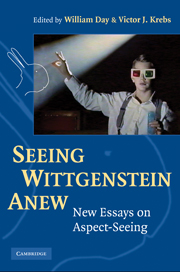Book contents
- Frontmatter
- Contents
- List of Contributors
- Acknowledgments
- Abbreviations of Wittgenstein's Works
- Seeing Wittgenstein Anew
- Introduction: Seeing Aspects in Wittgenstein
- I ASPECTS OF “SEEING-AS”
- II ASPECTS AND THE SELF
- III ASPECTS AND LANGUAGE
- 9 The Philosophical Significance of Meaning-Blindness
- 10 Wanting to Say Something
- IV ASPECTS AND METHOD
- Appendix: A Page Concordance for Unnumbered Remarks in Philosophical Investigations
- List of Works Cited
- Index
10 - Wanting to Say Something
Aspect-Blindness and Language
Published online by Cambridge University Press: 05 June 2012
- Frontmatter
- Contents
- List of Contributors
- Acknowledgments
- Abbreviations of Wittgenstein's Works
- Seeing Wittgenstein Anew
- Introduction: Seeing Aspects in Wittgenstein
- I ASPECTS OF “SEEING-AS”
- II ASPECTS AND THE SELF
- III ASPECTS AND LANGUAGE
- 9 The Philosophical Significance of Meaning-Blindness
- 10 Wanting to Say Something
- IV ASPECTS AND METHOD
- Appendix: A Page Concordance for Unnumbered Remarks in Philosophical Investigations
- List of Works Cited
- Index
Summary
Man hält mich auf der Straße oft für blind.
(RC III §280)INTRODUCTION
The mystery of why Wittgenstein takes an interest in the concept of aspect-seeing may be trumped only by the enigma of why he introduces the concept of aspect-blindness. After twenty pages of examining the place of aspect-seeing among our concepts of seeing and thinking, he announces that
the question now arises: Could there be human beings lacking in the capacity to see something as something—and what would that be like? What sort of consequences would it have?—Would this defect be comparable to color-blindness or to not having absolute pitch? – We will call it “aspect-blindness”—and will next consider what might be meant by this.
(PI 213f)Wittgenstein adds parenthetically that what he has in mind is specifically a “conceptual investigation.” This is his preferred name in Part II for the general method of the Investigations that has come to be called, and that he tends to describe in Part I as, grammatical investigations (cf. PI §90). But the ensuing discussion of aspect-blindness, which covers no more than a page, does not follow the pattern of other grammatical investigations. Wittgenstein's interest here seems to outstrip what such an investigation can accomplish. When in other contexts he imagines human beings in some way different from us, such as the builders in PI §2, he does not ask, as he does of the aspect-blind, whether there could be such people.
- Type
- Chapter
- Information
- Seeing Wittgenstein Anew , pp. 204 - 224Publisher: Cambridge University PressPrint publication year: 2010
- 7
- Cited by



